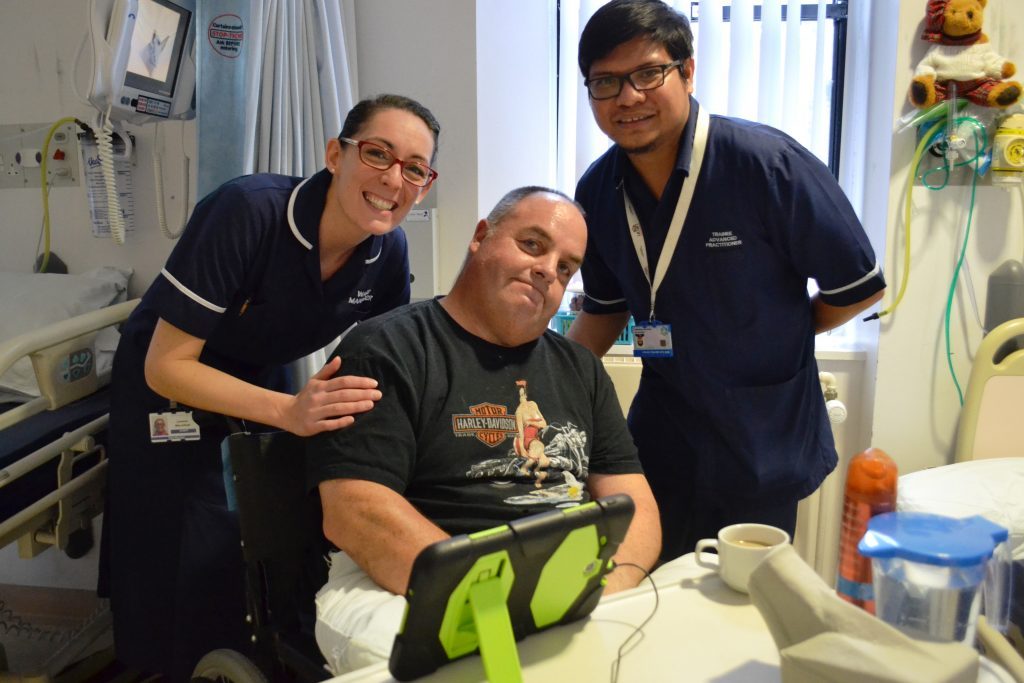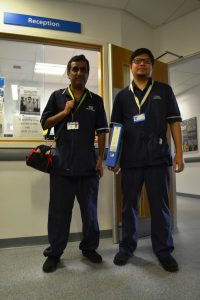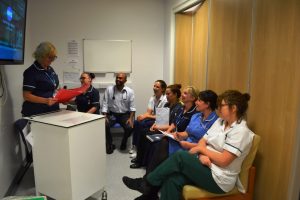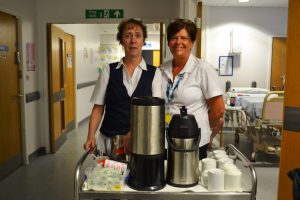In preparation for Stroke Awareness Day on October 29, Blackpool Victoria Hospital’s Stroke Unit has been highlighting their very varied patient care.
Ward Manager, Leanne Macefield, said: “We are very proud of the care we provide in our combined acute and rehabilitation Unit.
“Patients come on to the ward having suffered a stroke. Depending on the severity, patients can stay with us for months, slowly gaining strength and independence.”
Making up the care team are a combination of disciplines. As well as the consultants, doctors and nurses, there are healthcare assistants, occupational therapists, speech and language therapists, physiotherapists, ward clerks, housekeepers, hospital discharge team and four new trainee advanced practitioners. They all play a crucial role in patient recovery.
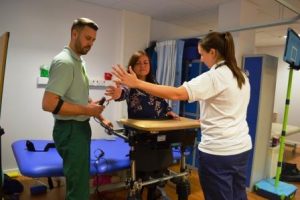
Some of the Stroke Unit team; patients work on their mobility using the Thera-Trainer in the Unit’s gym
Trainee Advanced Practitioner, Mark Delabajan, explained what happens when someone suspects a stroke: “Once an ambulance has been called, the paramedics will assess if the patient has had a stroke.
“All potential stroke patients with a definite onset time of symptoms of less than 4.5 hours , the paramedics will phone ahead and we will have a team ready to meet the patient in ED, assess for any contraindications for thrombolysis and take the patient to CT scan to exclude bleeding in the brain. Thrombolysis is a process where we administer clot dissolving medicine in an attempt to restore the blood circulation on the part of the brain that may have been affected by a stroke. We aim to do all this in the first 45 minutes of a patient’s arrival as time is a critical factor in determining and treating this type of stroke.”
Patients who have experienced other types of stroke will be transferred from A&E to the Stroke Unit within two hours.
From their arrival, patients are assessed each day and discussed at the daily “board round’’ meeting where care needs are discussed and implemented.
As a patient recovers, they move around the ward and increase their mobility with the help of physiotherapists and occupational therapists. The ward has its own gym and kitchen where patients can improve their skills and are assessed at the same time.
Multi-Disciplinary Meetings (MDTs) are held weekly where the therapists, nurses, doctors and hospital discharge facilitators come together to discuss each patient’s progress and make joint decisions on care.
Mark said: “We have a range of equipment in the gym to aid mobility skills including a new Thera-Trainer which supports patients with severe weakness as they start to rework muscles and regain balance.
“Our occupational therapists observe how patients cope with basic tasks in the kitchen. We often see weekly improvements with both cognition and physical function.”
One person that has been through this process is 52 year-old Peter Prince from Blackpool who had a stroke in September.
He said: “It started when I fell out of bed at home and I just couldn’t get myself up – I thought I had broken my back.”
The feeling came back into the left side of his body and Peter went to work as usual. A few days later however, his wife noticed that the left side of his face had dropped despite him feeling well in himself.
He said: “I was surprised that I may be having a stroke, especially at my age.
“I went to A&E and was transferred to the Stroke Unit very quickly and a CT scan showed blood clots in the brain.”
Peter was very immobile at this point, but the work of the physiotherapists has seen him improve over the last few weeks.
He added: “The care by people on this ward has been absolutely excellent. The physio team is fantastic.
“My diet has caused my stroke and this experience has been a wake-up call. With the help of the staff, I have cut back the sugar and have lost two stone and am continuing to get stronger. I hope to be back home soon.”
The theme running through this unit is one of commitment and care.
Mark added: “This unit feels like a family.
“The staff are highly trained and it is essential that they have a good knowledge of the secondary complications after a stroke has occurred.
“We get to know our patients and their families really well and as a result of this we’d like to think we are aiding recovery from a non-medical point of view too.”
